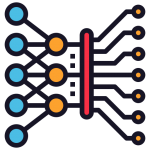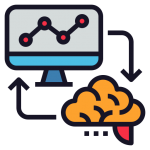Order to Cash


Process Mining to improve the Order to Cash process
In this current era the focus on Order to Cash has never been greater. How can CFO’s, Finance Managers and Finance Teams improve performance for this key business metric?
Take a look at our article on Process Mining and Process Tuning for our ideas on how this technology can help organisations to identify and eliminate Order to Cash process bottlenecks and process inefficiencies that may have built up over time.
Order to Cash Process Improvement
How can Chief Financial Officers, Finance Managers and finance teams improve performance in the key business metric of Order to Cash? The process is often the defining process of a company’s success.
Order to Cash Issues
As with any process, the Order to Cash (O2C) process flow is structured in a standard way so that many organisations and operations can use the process generically.
However, with the constantly changing needs of the business, organisations identify areas of the process that do not exactly meet their requirements. This leads to tweaks or customisations within the ERP system (Configuration, Extension, Modification, Localization, and Integration Framework = CEMLI’s).
Over time many of these changes build up and either create process bottlenecks or are replaced by new different CEMLI’s that obscure good practices and hide bad practices. Documentation on the modified process tends not to be completed or at best part completed adding to further complications when attempting to understand the process from start to finish.
The net result is often a process flow that has become overcomplicated leading to a slowing down of the O2C process
The Questions
In understanding the efficiency of an organisation’s O2C process these are some of the typical questions the CFO may be asking
- How long does the O2C process typically take?
- What may cause that to run slower?
- Who and what is involved in the process?
- What are the costs involved in our O2C process?
- Where are the bottlenecks occurring in our process?
- How many reworks of a process are occurring and why?
- How many process flows are obsolete and no longer serve any purpose?
- If we could eliminate bottlenecks, reworks and obsolete processes, what would that mean to cash flow?
- What would be the other business benefits that we could realise by improving our O2C process?
How can Process Mining help?
Process mining is a new concept that uses data mining tools and systems usage data to create a model of an organisation’s O2C process. By fully understanding the process flow throughout the whole O2C process, accurate assessments and process modelling can show:
Where inefficient processes and non-value tasks lie within the process flow?
What changes can be made and how do they have an effect on the up-stream and down-stream tasks?
Visually identify where process bottlenecks and slowdowns exist?
Model changes and see the effects created. If positive, make changes to the process?
Quantify the costs across the whole process and estimate savings before change?
Make assessment before and after changes are made?
The thickness of the lines denotes volume transactions and highlights where issues arise such as friction or workarounds. Everything can be tracked using the Unique ID and qualified with timings and function.
Once identified and captured the data can be used to create a process model and changes can be applied to test theories, identify low hanging fruit for quick changes and adapt processes to remove waste and bring the smiles back to the users. As an additional benefit part of the processes that are ripe for automation are easily identified leading to further improvements in functionality and cost savings using RPA.
Process Tuning and Automation
Once the process mining has been undertaken the output of the exercise typically delivers a list of process streams that have been measured against key metrics with the Order to Cash environment.
These can include timings from start to finish, velocity, volume, errors, works arounds and user involvement etc. Once identified the streams are graded and reviewed to identify those that are most suitable (Tactical change) up to longer term fixes (Strategic).
The process streams can be tuned by removing work arounds, reconfiguring CEMLI’s, deleting unused processes or ones that are no longer needed or viable.
In certain circumstances the process can be automated removing the need for any or limited user involvement and this can significantly improve processing throughput and service velocity.
Summary
Order to Cash is a central finance work stream and process that delivers great value to the host organisation. However, when it has been in place for a significant amount of time the efficiency of the process declines and leads to process debt that increases cost and reduce value over time.
By using Process Mining, Process Tuning and Automation organisations can reduce the debt and increase value by fully understanding what function processes and process streams are making to the corporate and operational finances and allows the Finance executive and management to better control their process spend whilst accelerating the income.
For further information on ONQU Process Tuning Services please contact Jim Brown at hello@onquautomation.com or visit www.onquautomation.com
About ONQU Automation
ONQU Automation is a specialist delivery partner for UiPath Robotic Process Automation (RPA), Process Mining and ABBYY Intelligent Document Solutions.
Operating from a Head Office in Birmingham (UK) and with bases in London (UK) for automation and Kerala (India) for managed RPA, Oracle services and support, ONQU delivers a wide range of discovery, consultancy and support services for whatever stage of the automation or support journey organisations are on.

Accurate Process Mapping
Traditional process capture and mapping relied on manual task, out dated documentation and subjective data.
Process mining uses accurate systems data.

Make Fact Based Decisions
Data is king and accurate data turns business decision making from an art form to a measurable, accurate and positive value driven exercise . Let your managers and executives decide with facts.

Increase Process Efficiency
Significantly ibcrease the effeciency of your processes and internal work functions. Process Mining will help you deliver value faster through process excellence.

Real Life Process View
Once the systems data has been captured an interrogated a real world, real life functional map can be created and reviewed.
A working model shows where there is process friction, lack of productivity and compliance.

Improve Worker Interaction
With data mining you can identify where your workers can spend the most productive time and where they don’t need to get involved. Free them from the drudgery of data tasks.

Cloud or Onsite
As with any modern technology your business can operate process mining in the cloud or within your own datacentre. This allows to manage resoruces more effectively so you can start smll and scale with success.

Significant Time Saving
Process Mining delivers a full understanding and comprehensive ovewrview of the prcesses that exist within your organisation. No longer do process reviews take months of interviews and long documentation reviews.

Improve Customer Service
Free your customer services team from undertaking processes that don’t require human attention or interaction. Remove processes that don’t add customer value.

Create Value
As with any investment the proposed outcome must be measured, monitored and compared. Because a process can be isolated then modelled chnages to the process or when automated can demostratre accuratley how much value has been achieved.

Contact Us
0121 803 8808
3 Gatsby Court, 172 Holiday Street, Birmingham
Business – Monday-Friday: 8am – 6pm
Get Started
For a Process Mining Demonstration and discussion please click here

